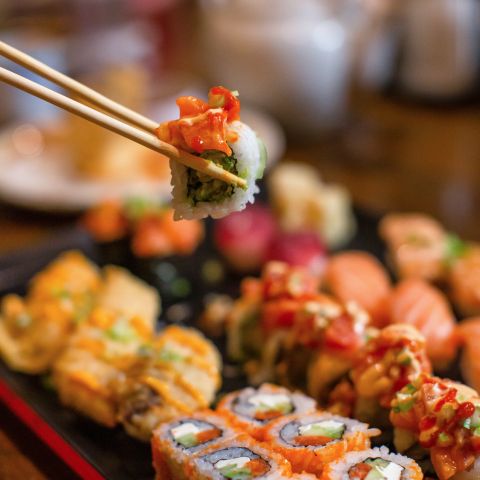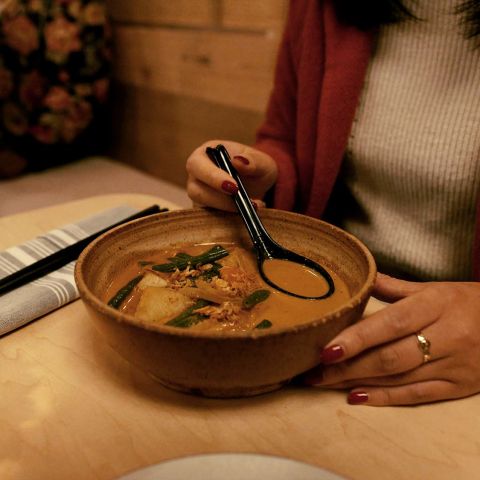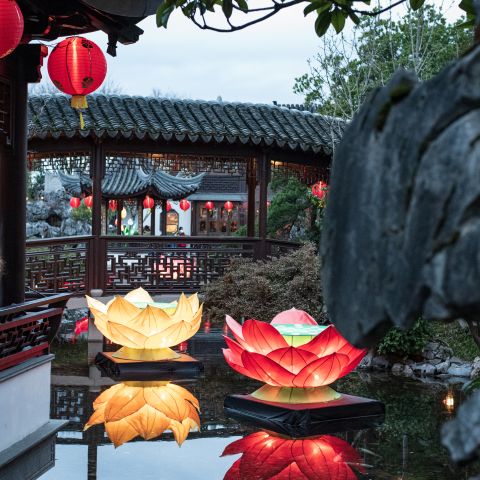Japanese American Community
Japanese Americans have been a vital part of Portland's history for generations.
This section was produced in collaboration with The Asian Reporter, a community newspaper featuring international and Pacific Northwest news and events with an Asian focus.
Japanese American History
In the 1890s, the first generation of landless Japanese farmers arrived in Oregon, hoping for better wages and employment opportunities. Mostly young men, the immigrants toiled building railroads, working in canneries and farming. The backbreaking work and scant wages sidelined many dreams of earning fortunes and returning home wealthy.
Many of these workers decided to forge new lives in Portland. By 1900, about 2,600 Japanese immigrants lived in Oregon, with more than half residing in Portland’s Nihonmachi (Japantown), located in present-day Old Town Chinatown. Many worked in service industries while others opened shops and restaurants. Some headed east to farm in the Hood River Valley, accounting for 75% of the Hood River strawberry harvest by 1920.
By 1940, Nihonmachi boasted more than 100 businesses within a six- to eight-block area, where the Japanese community could buy food, receive medical care, bank and obtain legal assistance. The Japanese-American community had a place to call its own and a place to thrive.
The Japanese American Experience
Visit these destinations to learn more about Japanese-American culture past and present.
That progress came to a halt on Feb. 19, 1942, when President Franklin D. Roosevelt signed Executive Order 9066, which led to the evacuation and internment of thousands of Japanese-American citizens. Entire families were herded into makeshift quarters at the Portland Assembly Center at the Portland International Livestock Exposition Center (now known as the Portland Expo Center) before being sent to internment camps throughout the region.
When Japanese Americans were allowed to return to their homes in 1945, they found most of their belongings gone, including their residences and businesses in Nihonmachi. Still, the spirit of the Issei (first-generation immigrants) prevailed, and Japanese Americans relocated throughout the city and the suburbs, bringing with them the unique cultural heritage that is alive and well in the modern landscape. While not forgetting past injustices, the Japanese community reestablished itself as an immensely important part of the vibrant city of Portland.
Portland became the sister city to Sapporo, Japan, in 1958. The Portland-Sapporo Sister City Association was formed to illuminate the many similarities and differences between the two cities and encourage and promote Japanese-themed events throughout Portland. The association is Portland’s oldest sister city association and one of the oldest in the nation. Its best-known collaboration is the world-famous Portland Japanese Garden. The Japanese Garden Society of Oregon commissioned Takuma Tono, an internationally recognized Japanese landscape architect, to supervise and develop the garden, which opened to the public in 1967. The original five gardens are still featured today, along with the Kashintei Tea House, which was imported from Japan and reassembled in 1968. The garden now attracts more than 220,000 visitors a year.
Bill Naito was one of Portland’s most influential and well-known businessmen and activists. Naito was born in Portland, years after his parents emigrated from Japan but were forced to move during the war. When he returned, he helped transform Portland into the city it has become today. He acquired several vacant/neglected historic buildings downtown and, in a short period, renovated them instead of following the trend of focusing on the suburbs. Naito is credited with coining the name “Old Town” for Portland’s Skid Road district to improve the area’s image, and one way he publicized the name was by having it painted in large letters on the side of a water tower atop the White Stage building. Naito worked to convince others of his vision that Portland could become a major U.S. city and strongly advocated the light rail system that was proposed in the 1970s. His input and collaborative effort led to the opening of the MAX light rail system in 1986. Shortly after Naito died in 1996, the Portland City Council renamed Front Avenue “Naito Parkway” in his memory. Naito Parkway runs along Waterfront Park, passing some of the historic districts Naito helped to preserve.
The Oregon Historical Society maintains substantial photo collections, news clippings and family history materials on Japanese Americans in Oregon. Collections include letters, diaries and objects from the internment.
A private, non-profit membership organization, the Japan-America Society of Oregon is dedicated to promoting business, education and cultural exchange and enhancing mutual understanding between the people of Japan, Oregon and Southwest Washington.
Mentioned Elsewhere Online
Japanese American Museum of Oregon & the Architectural Heritage Center
Japanese American Citizens League
Japanese American Culture in Portland
Connect with Portland’s rich Japanese-American heritage at sites around the city.
Historic Sites and Museums
Japanese American Historical Plaza
Thirteen stone markers commemorate the history of the Issei (first-generation Japanese) and their descendants in the Japanese American Historical Plaza. One hundred ornamental cherry trees link the plaza to the Friendship Circle, where you’ll find a “singing” sculpture created to celebrate Portland’s 30-year Sister City relationship with Sapporo, Japan. Guided tours are offered by the Japanese American Museum of Oregon and by Kizuna Tours Portland.
Japanese American Museum of Oregon
The Japanese American Museum of Oregon preserves and shares the culture and history of Japanese Americans in the Pacific Northwest through exhibits, talks and community events. The museum’s location, in an area referred to today as “Old Town Chinatown,” was home to more than 100 Japanese businesses prior to the spring of 1942.

Credit: Justin Katigbak
The museum highlights the Issei immigration and retells the story of early life in Oregon, Nihonmachi, and life after Executive Order 9066, including the Portland Assembly Center and contemporary Nikkei life. The center displays rotating exhibits and strives to preserve and share the history and culture of the Japanese-American community through cultural performances, guest speakers and monthly community events.
Nichiren Buddhist Temple of Portland
The Nichiren Buddhist Temple of Portland is a community center that hosts annual events, including a New Year’s celebration, an event for Buddha’s birthday, and festivals for spring and Obon. Visitors are welcome.
Oregon Buddhist Temple
One of the oldest religious centers for the Japanese community, the Oregon Buddhist Temple is especially noteworthy for its beautiful sanctuary altar. The temple hosts special events to celebrate the new year, the birth of Buddha and also Obon. Visitors are welcome.
Portland Japanese Garden


Acclaimed as the most authentic Japanese garden outside of Japan, this is an ideal retreat for meditation and contemplation. Covering nearly 12 acres (5 ha), the Portland Japanese Garden features eight different gardens replete with exquisite plants, carefully placed stones and relaxing pools.
Japanese American Art
The Portland Art Museum has six galleries dedicated to its extensive collection of Asian art. The Japanese galleries include prints, paintings and decorative art from the Edo and Meiji periods, as well as contemporary art.

Asian American drum ensemble Portland Taiko performs yearly at festivals, parks and other venues. Taiko is an energetic fusion of traditional Japanese drumming, rhythm, movement and storytelling.
Japanese American Events
Shinnenkai is a traditional Japanese way of getting together to celebrate a new year. During this time, people promise to do their best and wish each other good luck and fortune.
The Day of Remembrance, February 19th, at the Japanese American Museum of Oregon, commemorates the incarceration of more than 120,000 persons of Japanese ancestry during World War II.
Annual Events at the Portland Japanese Garden
In January, the Portland Japanese Garden hosts the O-Shogatsu Japanese New Year celebration, featuring traditional activities for children, a kakizome calligraphy demonstration and more.
The Japanese Festival of Dolls, held in March, Hina Matsuri, features a display of hina ningyo dolls (elaborately costumed figures depicting the imperial family and its courtiers) and an opportunity for girls to dress in cotton yukata for photographs in front of the dolls.
Every March, the Portland Chapter of the Ohara School of Ikebana is noted for developing the moribana style, which breaks with the more formal vertical style of the past to create horizontal “landscape” arrangements at the Portland Japanese Garden.
In May, the Children’s Day festival, Kodomo no Hi, at the Portland Japanese Garden features activities and entertainment, including raising the koi nobori (carp banner), taiko drumming, crafts and more.
Tanabata, also known as the Star Festival, occurs every July. During this festival, wishes written on strips of paper are hung on trees in hopes of coming true. The popular summer festival at the Portland Japanese Garden has roots in an old fable about two lovers who are allowed to meet only once per year and includes storytelling, origami and traditional music.
The flower-viewing Kiku Matsuri festival at the Portland Japanese Garden highlights the chrysanthemum, a September bloom and Japan’s imperial flower.
Coinciding with the harvest moon, which occurs sometime in September to early October, the Portland Japanese Garden hosts O-Tsukimi, the Moon Viewing Festival. The evening is an opportunity to gather, appreciate the moon’s beauty, and pray for good fortune and an abundant harvest.
Japanese Cuisine
Local artisans are using traditional methods to craft some of the city's most delicious food.
Asian Bakeries in Portland
Find your next favorite Asian bakery in Portland, with options like bulgogi croissants and mochi doughnuts; you’ll want to try them all.
Eight Great Sushi Spots Around Portland
Portland is only an hour away from the Pacific Ocean, so it should come as no surprise that the city’s sushi options are both delicious and expansive.
Portland Ramen Restaurants
The Portland ramen scene has exploded in recent years, spurred by the arrival of two authentic eateries straight from Tokyo.
Annual Events at the Japanese American Museum of Oregon
The highly anticipated Cherry Blossom Bazaar takes place in mid-March. Admission is free, and it’s a great place to find Japanese clothing, furniture and unusual collectibles. There’s something for every age, interest and budget. All proceeds benefit the Japanese American Museum of Oregon.
Learn how to hunt and gather Matsutake mushrooms from the Japanese American Museum of Oregon. The annual Matsutake Hunt is designed for novices and takes place on the coast. Don’t forget to bring rain gear to keep you warm while walking through the forest.
Annual Events at the Oregon Buddhist Temple
ObonFest, a traditional festival honoring ancestors, features Obon Odori dancing, taiko performances, martial arts demonstrations, temple talks, Asian crafts, kids’ activities and food. Free practice sessions for Odori folk dancing at ObonFest are held in late July and early August at the Oregon Buddhist Temple.
The Oregon Buddhist Temple hosts their annual Fall Bazaar, where you can shop for omiyage and items made by local artisans. Browse hand-made items like candles and paper crafts or sample delicious food, like Chirashi Sushi or Mar Far Chicken.
Like the bazaar held in the fall, the Oregon Buddhist Temple hosts a Holiday Craft Fair every December, where you can find the perfect handmade item for anyone on your list. Local artisans and crafters set up inside the historic temple, allowing shoppers a warm and dry shopping experience.
Japanese American Events
Discover and celebrate the Japanese American Community at these upcoming events in Portland.
Japanese American Festivals
Learn more about these annual festivals and celebrations in Portland.
Lunar New Year Celebrations in Portland
Portland’s Asian communities celebrate the Lunar New Year with traditional dances, lantern ceremonies and stunning performances.
Where to Find Portland Cherry Blossoms
Sakura blooms take over the waterfront each spring; here’s how to enjoy the best of Portland’s cherry blossom season.
Jade International Night Market
Thousands gather every August in Southeast Portland to celebrate the Jade District’s diverse immigrant community at the Jade International Night Market.
Was this page helpful?





